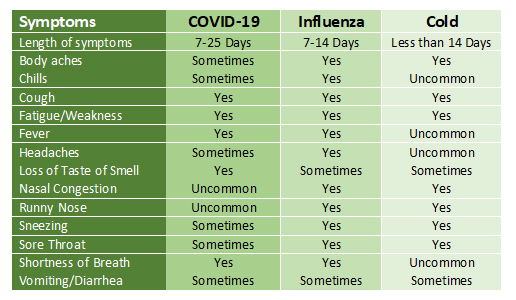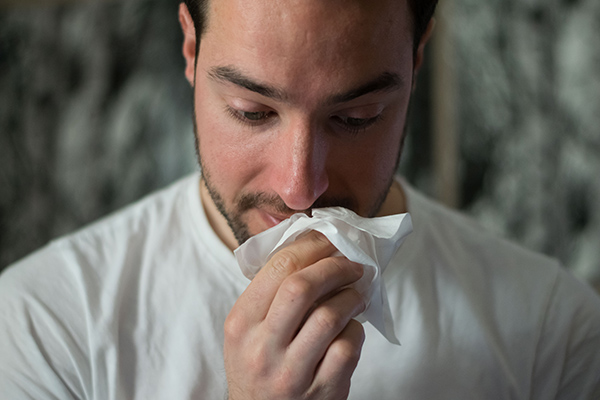Flu, Cold, and COVID-19: How to tell the difference
When symptoms of seasonal illness set in, it won’t always be clear which infection you’re dealing with. Because it will be difficult to tell them apart, contact your provider to determine what care you may need, including testing.
- COVID-19 is a highly contagious respiratory illness. COVID-19 can have varying degrees of symptoms, from none to severe. Symptoms may include fever or chills, severe cough, sore throat and the loss of taste or smell. COVID-19 can cause medical complications, especially in higher-risk groups, and can result in hospitalization and death. If you think you’ve been exposed to COVID-19 or are experiencing symptoms, learn more about options for screening and receiving care.
- The flu is a contagious respiratory illness that can cause mild to severe illness, with symptoms such as fever, cough and body aches. Most people with the flu don’t need medical care or medication. However, the flu can be very serious and require medical attention. Contact your doctor if your symptoms worsen, are prolonged, or if you’re at high risk of flu-related complications. Testing may be necessary to confirm a diagnosis.
- With a cold, you may feel pretty crummy, but the symptoms (e.g., cough, sore throat, fatigue, etc.) are mild in comparison to viruses like the flu and COVID-19. Rest and many over-the-counter medications can help relieve symptoms.
Still unsure? Check your symptoms against this chart.

With the cold, flu and COVID-19 circulating in our communities, it’s more important than ever to stay healthy. The flu shot and COVID-19 vaccine is your best defense against serious illness and reduces the risk of spreading contagious diseases to friends, family and your community. And, it’s safe to get both the flu and COVID vaccine at the same time. Learn more about COVID-19 and flu shots.
Flu Season Questions Answered with PacMed’s Dr. Stewart
It’s flu season again—and lest we forget—the pandemic isn’t over yet, so it’s great timing to refresh our memories about flu season and getting our flu shots. I spoke with Family Medicine physician, Dr. Jimmie Stewart from Pacific Medical Centers (PacMed) about this topic this week.
Seattleite: When should we get the flu shot? And who do you recommend gets one?
Dr. Jimmie Stewart: I’d recommend people get it as soon as possible. Whenever you possibly can. I recommend anyone 6 months and up get vaccinated unless specifically recommended not to by their doctor.
Seattleite: Who’s at increased risk for getting the flu?
Dr. Jimmie Stewart: Anyone over 65 and those with lung disease (which can include smoking or asthma), heart disease, or who is immunocompromised are all at greater risk.
Seattleite: What would you say to people who say they don’t get the flu shot because it only reduces flu illness by an average of 40-60%?
Dr. Jimmie Stewart: No vaccine is perfect, but across the board, those who get the flu shot tend to have better outcomes if they are exposed to or get sick from the flu. It also helps decrease risk of hospitalization and can resolve a lot quicker.
Seattleite: Some people say they avoid getting the flu shot because they get super sick from it. What would you say to them?
Dr. Jimmie Stewart: Usually some symptoms is the appropriate response, which can last from 24 hours to a few days. That means your immune system is activating. Symptoms can range, but can include: lower energy, feeling unwell, nausea, and upset stomach. However, compared to getting the flu these side effects are mild, as flu symptoms can last weeks.
Seattleite: Do you have any advice on how to differentiate between COVID-19 and flu symptoms?
Dr. Jimmie Stewart: They are both viruses so they can be hard to differentiate, especially in the beginning phases. Both could have symptoms of fever, lower energy, shortness of breath, and a cough. The biggest telltale COVID-19 symptom might by losing your taste and smell. The best way to find out for sure is to get tested.
Seattleite: What do you think about getting the COVID-19 booster shot and the flu shot at the same time? Are there increased symptoms?
Dr. Jimmie Stewart: Yes, the flu shot can be co-administered with COVID-19 vaccines. The efficacy doesn’t change if you get the shots together or not. It’s hard to say for sure if it would cause more symptoms because it’s so variable. Some people still won’t experience any symptoms and some people feel unwell for a day or two.
Seattleite: As a doctor, what are you comfortable doing in your personal life, in terms of navigating Covid-19 risk?
Dr. Jimmie Stewart: I am playing it much safer because I do see immunocompromised patients and people at risk. I try to take precautions and avoid unnecessary exposure when possible. I think it is important to assess your own responsibilities and risk to determine what is safest for you, your loved ones, and your community. It’s important to be honest if you’re experiencing any symptoms and to take the appropriate steps to isolate and test.
Dr. Stewart is a family medicine physician at PacMed.




